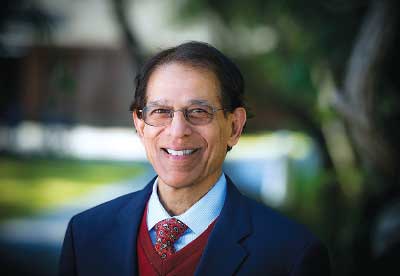Former APA President Dilip Jeste, M.D., was recently honored by the American Association of Chairs of Departments of Psychiatry (AACDP). He was selected to receive the AACDP’s 2018 Presidential Award for Distinguished Scientific Achievement and Recognition of Outstanding Scientific Accomplishments and Leadership in the Field of Psychiatry.
The award was presented to Jeste by the AACDP’s president, Mark Rapaport, M.D., chair and chief of psychiatric services in the Department of Psychiatry and Behavioral Neurosciences at Emory University School of Medicine, at the AACDP’s meeting earlier this year in New York City.
The AACDP, which represents the leaders of psychiatry departments in all U.S. and Canadian medical schools, is committed to promoting excellence in psychiatric education, research, and clinical care.
Jeste is a world-renowned and highly accomplished geriatric psychiatrist who specializes in the challenges of successful and healthy aging, the neurobiology of wisdom, and schizophrenia and other psychotic disorders in older adults. He is the Estelle and Edgar Levi Chair in Aging and Distinguished Professor of Psychiatry and Neurosciences at the University of California in San Diego, director of the Sam and Rose Stein Institute for Research on Aging, and co-director of the new IBM-UCSD Center on Artificial Intelligence for Healthy Living.
As part of the AACDP’s presidential award presentation, Jeste delivered the lecture “Schizophrenia and Aging: Bad News and Good News.” In his lecture, he questioned whether schizophrenia is a disease only of the brain or an accelerated aging disease of the whole body, given that various diseases of aging, such as diabetes, metabolic disorders, heart disease, and some cancers, occur in schizophrenia patients at a younger age than the general population and result in premature mortality. He noted that while the physical health of schizophrenia patients declines at a faster age-related rate, they show improvement in mental health, including fewer psychotic symptoms, fewer psychotic relapses, less substance use, and better treatment adherence. Although patients with schizophrenia typically have mild baseline cognitive deficits, they usually exhibit a normal rate of age-related cognitive decline, he said.
Jeste emphasized the following strategies for successful aging in people with schizophrenia: optimal pharmacotherapy and psychosocial interventions, essential health care, healthy diet and exercise, and social support with positive attitude.
“The AACDP is honored to have hosted Dr. Jeste’s presentation,” said Rapaport, “and we congratulate him for his outstanding career accomplishments and groundbreaking research into the interdependent physiological, genetic, biochemical, economic, social, and psychological factors of healthy and successful aging.” ■
More information on Jeste’s research can be accessed
here. More information on the AACDP is available
here.


